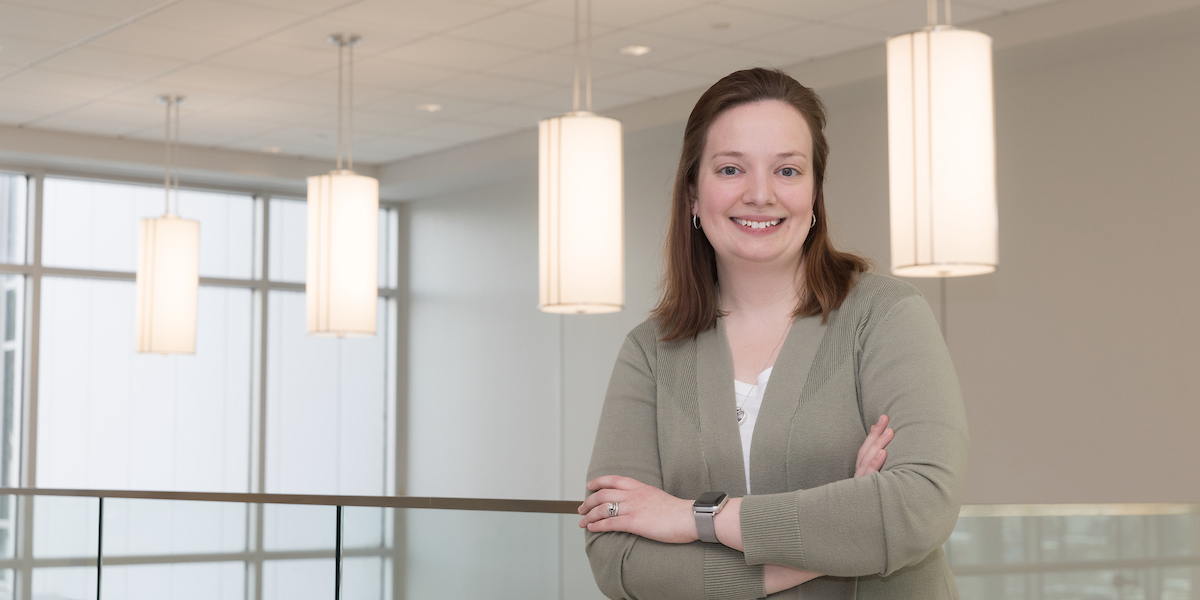Puzzle solver Erin Pauling wears many hats

With a toddler at home; a commute to and from Cortland; and research, teaching, clinical and curricular oversight responsibilities, Erin Pauling has a lot of pulls on her time. It’s lucky that she’s a puzzle solver who enjoys figuring out schedules.
As the assistant dean for academic affairs, Pauling oversees the School of Pharmacy and Pharmaceutical Sciences curriculum as it relates to accreditation standards. “It involves curriculum mapping to ensure we’re hitting all of the required components with appropriate redundancy,” she said. “I work in partnership with all of the department chairs, who actually assign the faculty to teach the courses. I schedule the courses and they schedule the personnel.
“Initially, it felt very early in my career to be taking on an administrative role, but at the same time I felt ready because of being at a new school and having chaired committees, served on task forces and gotten through COVID disruptions,” said Pauling, adding that she also worked with her predecessor in the role who made her feel she could handle it.
The Accreditation Council for Pharmacy Education (ACPE) is updating all of its standards, to be released in June 2024, with implementation required by July 2025, Pauling said. “There will be changes that will influence components of our curriculum or of data we need to look at. It’s not likely to be wholesale changes, but we will have to go through all of our documentation.
“It’s an interesting time to be doing academic affairs!” she said.
Pauling, who is originally from Berwick, Pa., received her PharmD from the Bernard J. Dunn School of Pharmacy at Shenandoah University. After that, she completed a PGY1 Community Pharmacy Residency at Appalachian College of Pharmacy, and a PGY2 Ambulatory Care Residency at Wingate University School of Pharmacy.
Locally, her clinical responsibility is as an ambulatory care pharmacist with UHS in its Vestal office, where there is a bit of flexibility thanks to colleagues like clinical assistant professor Amanda Mogul and the nature of the work. “It’s nice because it’s appointment-based so we can block the schedule for appointments if needed.”
Pauling said it can be tough to manage such a hectic schedule, for herself as well as the school’s course schedule, but there’s also a sense of accomplishment that comes with it, such as when she was scheduling courses during the pandemic. “I liked solving that logic puzzle of figuring out the COVID schedule over three classrooms, as well as IPE activities with 29 breakout rooms.”
Her life, she said, is “about work-life harmony. I think of an orchestra or a band where sometimes the woodwinds take the lead, and other times the percussionists. Over time, there is harmony and balance.”
She does her best to keep to a regular schedule, including her daily hour-long commute to work, though the pandemic has thrown some twists in at times. Her daughter is in daycare in Johnson City, but “the first week of classes, I had to get her twice from there” due to the coronavirus.
And there’s also her teaching schedule to consider. This semester, she’s teaching the Foundations for Interprofessional Communication course that includes public health, nurse practitioner and social work students, in addition to PharmD students.
She’s also teaching first-year pharmacy students in the Skills Lab about immunizations and initial interactions with standardized patients. “Standardized patients are community members and students who have been trained to act the role of a patient to give students experience gathering information, educating and counseling patients and making recommendations based on the patients’ complaints,” Pauling said.
“A lot of this lab is about self-care and over-the-counter products,” she added. “This past fall, we presented the didactic piece and this spring it’s more of the hands-on to prepare them for their community rotation this summer.”
Pauling is also teaching a two-week IPE geriatrics activity for third-year students, and SUNY Upstate medical students who are performing annual wellness visits to assess patients for fall risks.
On top of all that, she’s also teaching half of a brand-new elective in family medicine with clinical assistant professor Kelsey Henning.
She’s the inpatient pharmacist and I’m the outpatient ambulatory care pharmacist,” Pauling said. “We’re talking about transitions of care with very common disease states. One of the main things I do is an anticoagulation clinic, primarily with warfarin, to treat a clot or because the patient has a condition with higher risk of developing a clot.”
Such care is highly individualized and requires a great deal of follow up and lab tests, Pauling said. “It plays into that whole puzzle piece that fascinates me as well because warfarin is a very finicky medication that doesn’t have set doses, is affected by food, alcohol and an individual’s DNA, as well as by other disease states. There’s no such thing as a one-size-fits all warfarin dosage.”
Pauling is also working with some students on their capstone research projects.
On yet another front, she is excited that she has her first publication, focused on the use of the Pharmacists’ Patient Care Process to address social determinants of health in patients with diabetes.
The article resulted from connecting with individuals she met through the American Pharmacists Association (APhA) and a White Coat ceremony speaker from the Food and Drug Administration Office of Minority Health and Health Equity, she said. “I’ll also be speaking at the APhA meeting on social determinants of health and diabetes management.”
With all that she has going on, how does Pauling stay stress-free?
“I bought a Peloton in March 2021 and I ride it every single day. I feel mentally different now if I don’t do it.” she said. “People joke about it but I pick every ride based upon the music. Sometimes I go hard and sometimes leisurely. It’s more about the mental aspect and refocusing. I can tell what kind of day I’ve had if I get a personal best!”
